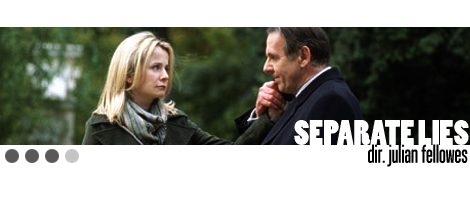
Expanding upon his usual theme of deception among the British upper class, Julian Fellowes’s directorial debut Separate Lies is a film with enough intelligence and insight to make up for its few technical and structural deficiencies.
Tom Wilkinson and Emily Watson give strong performances as James and Anne Manning, a couple who have let the silences in their marriage overtake their passion. James is an esteemed London solicitor (“He’s very expensive,” Anne condescendingly tells a friend who asks if James is good at his job) who has let reason and pragmatism bleed from his professional life to his personal life. Anne, frustrated and exhausted from the standards to which James (perhaps unknowingly) holds her, begins an affair with Bill (Rupert Everett), a well-to-do friend of the family who has recently returned from a stay in New York. Their romance entangles them legally as well as emotionally when the husband of the Mannings’ maid is injured by a passing car, a hit and run whose investigation calls upon all three as witnesses.
The film, adapted (from a novel by Nigel Balchin) as well as directed by Fellowes, finds occasional moment of domestic tumult which shatter the Mannings’ precarious tranquility with surprisingly strong effect; one scene in particular makes food preparation more suspenseful than I had ever thought possible, climaxing with a plate shattering with such resonance that the world outside could explode without the Mannings — or the audience — so much as flinching. That Fellowes is able to wring such intensity from these tiny moments makes the film’s failings that much more upsetting. What I assume are meant to be revelations occur so early in the film that they play more as plot developments than as twists, robbing them of some of their impact. And by the last twenty minutes of the film, months and years pass so quickly that Fellowes resorts to telling of the passage of time through voice over.
Still, the film contains a wealth of the dark, dry British humor for which Fellowes is renowned. Take for instance the scene in which an argument about Bill’s role in the hit and run leads to Anne’s admission of infidelity:
“Fuck Bill.”
“That’s the thing; I do fuck Bill.”
Even more enjoyable, however, is how the psychological and social dynamic of infidelity is illustrated. James, of course, appears at first as the more noble of the two, but his skills as a solicitor reveal themselves in several scenes in which his careful navigation of marital spats leads his wife to suggest the actions she would likely dismiss were they proposed by James. “You said it yourself,” he adds afterwards as an aloof rejoinder, perverting Anne’s own words to reach his own endgame. It takes her a while, but Anne does realize her deceptions are being met blow for blow by James’s machinations. “I fail every test you set me,” she tells him, “yet you keep setting them. Why?”
But James’s journey is the most interesting aspect of the film, as he rediscovers his love for Anne and, rather than snipe at her, takes the moral high ground and offers his support of her choices. His pragmatism allows him to see every situation from several viewpoints, and his harsh judgment of Anne cannot help but make him reevaluate himself. “We’re all wreckers,” he concedes at one point, “we make choices, we make them for the best and most loving reasons, but we don’t see the damage we cause.” It is lucky for the characters of Separate Lies that they learn the damages they have caused before it is too late for them to mend appearances and salvage their lives as well as their dignity.
